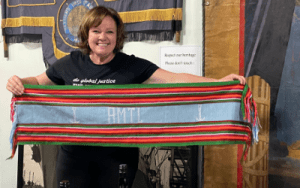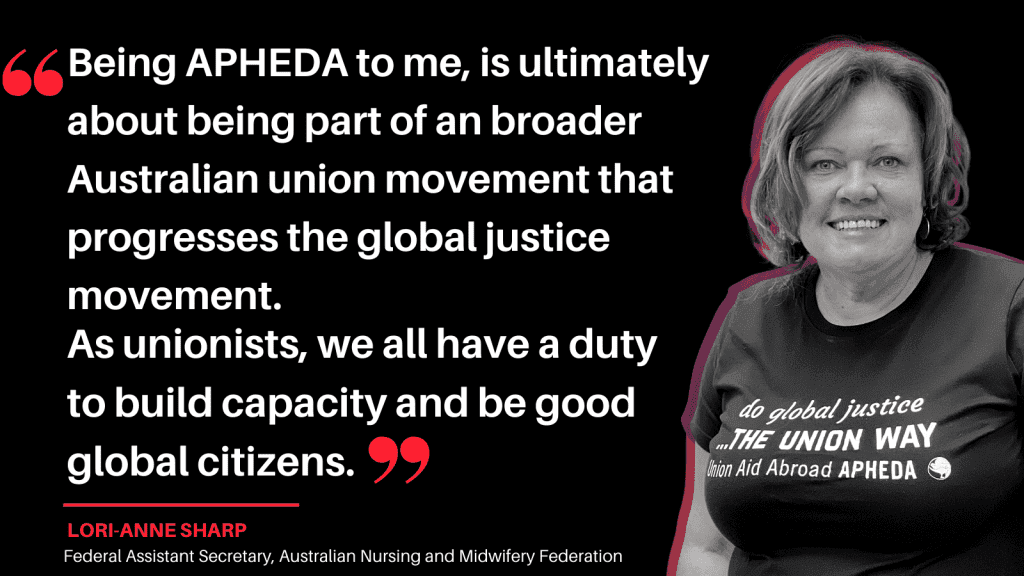APHEDA People: Meet Lori-Anne Sharp (ANMF)
 Union Aid Abroad-APHEDA is about people – people working together to make things better for all. As the global justice organisation of the Australian union movement, each and every APHEDA supporter, member, partner, activist and participant here in Australia and all around the world contributes to the work it takes to tackle inequality and injustice.
Union Aid Abroad-APHEDA is about people – people working together to make things better for all. As the global justice organisation of the Australian union movement, each and every APHEDA supporter, member, partner, activist and participant here in Australia and all around the world contributes to the work it takes to tackle inequality and injustice.
This month we meet Lori-Anne Sharp, a Member of APHEDA’s Board and the Federal Assistant Secretary of the Australian Nurses and Midwifery Federation (ANMF). Lori-Anne talks to APHEDA about her passion for social justice and why, as unionists, we have a responsibility to build capacity and be good global citizens
As the Federal Assistant Secretary of the ANMF, what does it mean to be union to you?
For me, being union means being involved in a broader movement that seeks to improve the working lives of workers. It means sharing a common set of values including collectivism and fighting for equality, justice and fairness. It also means having the capacity to empower others and bringing people together to join the collective and striving to achieve better working conditions, equality and justice. From a nursing perspective, it is not only about progressing social justice issues but, in our union, it is about securing safe staffing levels and improving both the working conditions and the working lives of our members. For nurses, and other workers, it is about ending occupational violence and having access to different types of leave including family violence leave.
What does it mean to be APHEDA to you? What drew you to APHEDA to start with?
I wasn’t aware of APHEDA until my involvement in the ANMF Victorian Branch Council. My first encounter was a presentation by Kate Lee to our Branch Council. I have a very strong interest in social justice issues so I was immediately drawn into the values and APHEDA’s commitment to social justice, economic equality and the realisation of human rights. My background is in community health, working with people experiencing homelessness and engaging them in health and supporting them into accessing mainstream health services. When I heard about APHEDA, I felt like my values were aligned. My core values are really about sticking up for the pointy end of society – those with limited resources and who could benefit from assistance and the means to organise and improve their lives. That was what first drew me in. Being APHEDA to me, is ultimately about being part of an broader Australian union movement that progresses the global justice movement. As unionists, we all have a duty to build capacity and be good global citizens.
Why is building internationalism in Australia important?
We are all part of a big world. I think that for a country like Australia that is well resourced, it is important we assist our neighbours and countries in need. As internationalists, we can share our learnings, empower people and improve their well-being and working lives as well as their organisational capacity. Building internationalism now is super critical in terms of the global pandemic. COVID-19 is far from over and it has not treated people equally. With more than 3.8 million deaths worldwide, this pandemic isn’t going to be over until everyone is vaccinated. The onus is on well-resourced countries like Australia to stop blocking access to vaccines and fight for global access, to share resources and to support people to build adequate health systems. In 2021, internationalism is more important than ever!
Pre-COVID, people were already struggling. But this pandemic has highlighted that we need to unite to address increasing inequalities. I have noticed that there is a bit of pandemic lethargy. We are almost tired of hearing about it. So the challenge when we are building internationalism is to acknowledge that we have suffered. But to also get across the fact that other countries have suffered so much more than we have. Whatever we can do to boost their livelihoods, we should be doing. Everyone can play their part.
What part of APHEDA’s work are you most connected to/proud of? Why?
I am still getting to know all the programs and projects that APEDA supports. There are 45! From a historical perspective, it is the Asbestos. Not here. Not anywhere. Campaign that I feel connected to, particularly in Vietnam. I think for nurses, this campaign really resonates because many of them have nursed people with mesothelioma and it is something they can relate to. In Australia, protections are much greater and we have done a lot to create awareness. APHEDA’s campaign has made tangible progress and achievements towards banning asbestos in Vietnam, Cambodia, Indonesia and Laos. The positive impacts are lifelong and the potential deaths that are being prevented is something we should be really proud of.
The other work I feel proud of is APHEDA’s commitment to supporting women’s movements and achieving equality and justice in their communities; especially in relation to the COVID-19 pandemic. Women are disproportionately impacted and their burden is greater. Some of the work APHEDA has done advocating for women leaders in the political sphere is hard but it is important work. It is important for women to have a voice in politics and as leaders. I am proud of this work especially as a leader of a union of which 89% of members are female this resonates with me.
As a member of APHEDA’s Board, what do you see as the work that is most important for Union Aid Abroad to focus on into the future?
I guess in the context of the pandemic, things have been difficult and I think that we continue to focus on cementing those relationships and partnership abroad and assisting those vulnerable communities in the recovery. We are still going through it at the moment but supporting work in gender specific projects in countries that are still experiencing the devastating effects of COVID – like India – is crucial. It will take decades to recover. We need to look at ways we can continue to support our current partner organisations and projects into the future. It will be about restoring and building on existing relationships and looking at building new ones. Different things will come up and different priorities will emerge. We need to be flexible and adaptable in our approach to meet people’s needs as they arise.
When you have one-on-one conversations with people asking them to join Union Aid Abroad, how do you describe the work and ask people to join?
For me, I can relate to APHEDA as a nurse was a driving force in the founding of the organisation, Helen McCue. When you talk to people one-on-one, it is about picking the right moment. Sometimes people aren’t ready to hear things–you need to be able to read it and usually it is going to take more than one conversation. Essentially it is about planting a seed then being committed to coming back and talking more about the work of APHEDA and its partner organisations. Anyone who is a member of ANMF is already contributing to this bigger global movement (through ANMF’s advocacy and support for APHEDA). But they can contribute more by becoming an individual member. I try and use health related projects as that resonates with our members. At ANMF, we are trying to educate people through our journal (ANMJ) and sharing stories about the training that APHEDA does so that they can see a snapshot of the work and feel part of it. Asking people to join can be difficult because not everyone has the resources to join. So taking a gentle approach is important. However, holding fundraisers and events is a great way to bring people on board for the first time and to plant that seed. They get to hear about the work of APHEDA in a fun, social environment. Whenever I can, I always encourage people to come along to APHEDA’s events because I know there are always going to be APHEDA champions and members who will be working hard to plant those seeds and bring new people into the global justice family. But it does need to be on your mind all the time and you just need to keep chipping away at it. I try and make people feel part of it already and anything extra is a bonus. Highlighting why it is important and why we can all play a role is powerful.
Joining is simple. Fill out the join form today. Or give us a call on 02 9264 9343.

